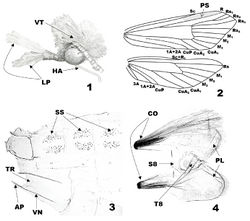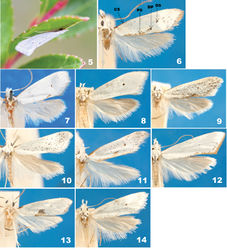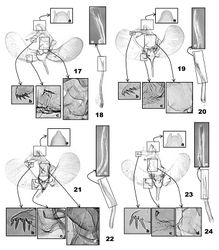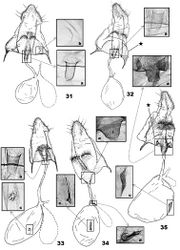Eucalantica costaricae
| Notice: | This page is derived from the original publication listed below, whose author(s) should always be credited. Further contributors may edit and improve the content of this page and, consequently, need to be credited as well (see page history). Any assessment of factual correctness requires a careful review of the original article as well as of subsequent contributions.
If you are uncertain whether your planned contribution is correct or not, we suggest that you use the associated discussion page instead of editing the page directly. This page should be cited as follows (rationale):
Citation formats to copy and paste
BibTeX: @article{Sohn2011ZooKeys118, RIS/ Endnote: TY - JOUR Wikipedia/ Citizendium: <ref name="Sohn2011ZooKeys118">{{Citation See also the citation download page at the journal. |
Ordo: Lepidoptera
Familia: Yponomeutidae
Genus: Eucalantica
Name
Eucalantica costaricae Sohn & Nishida sp. n. – Wikispecies link – ZooBank link – Pensoft Profile
Type material
Holotype ♂ – COSTA RICA: Cartago, El Guarco, Macizo de la Muerte, Sector de la esperanza, 9°46'14" N; 83°47'59"W, alt. 2600m, February 2002, R Delgado, BN-INB0003434063, GSN [SJC 640] (INBIO). Paratypes (5♂2♀) – COSTA RICA: 2♂, San José, Cerro de la Muerte, Villa Mills, La Georgina, 9°34'N; 83°43'W, alt. 3000m, 20 February 1999, K Nishida (USNM & UCR); 1♀, San José, Cerro de la Muerte, Estación Biológica de la UCR, 9°34'N; 83°45'W, alt. 3050m, 2 February 1999, K. Nishida (BMNH). 1♂, Cartago, Cerro de la Muerte, Georgina, 9°34'N; 83°45'W, alt. 3000m, 23–25 May 1985, J Powell & PA Opler (INBIO); 1♂, ditto (EMEC); 1♂, ditto, 20 June 1988, J Brown & J Powell (EMEC); 1♀, Cartago, Villa Mills, 9°34'N; 83°43'W, alt. 3000m, 3–4 July 1999, J Powell (EMEC).
Diagnosis
This new species is superficially indistinguishable from some variants of Eucalantica polita. In such cases, examination of genitalia is necessary for reliable identification. Eucalantica costaricae differs from Eucalantica polita by the lack of lateral projections near the apex of the uncus in the male genitalia and in having a signum in the corpus bursae of the female genitalia.
Description
(Fig. 10). Forewing length 6.5–8mm (mean=7.48mm, n=9); posterior suffusion and dorsal patch absent; in majority of individuals, black spots scattered on distal and posterior half; fringes entirely white. In some specimens, all forewing pattern elements are lost except a discal spot. Hindwing anterior margin 3× longer than the maxium width; fringes entirely white.
Male genitalia
(Figs 19, 20) (5 preparations examined). Uncus (Fig. 19a) linguiform apically; socii lunate, as long as saccus, long hairy dorsally, with four terminal spines in a row, third spine from tip longest, followed by second, fourth, and first in order of length (Fig. 19b). Tegumen subtriangular, 1.5× broader than uncus; subscaphium (Fig. 19d) appressed to tegumen. Valva obovate, 2.5× longer than socii, costa slightly incurved at basal 1/3; arched setose area above saccular base (Fig. 19c). Saccus very slender, as long as socius. Aedeagus (Fig. 20) attenuate in distal half, as long as and slightly wider than saccus, bent medially; carina slender, triangular; a zone of minute spinulate cornuti in distal half of aedeagus.
Female genitalia
(Fig. 33) (2 preparations examined). S8 sclerotized; minute thorns on semicircular area above S8 humps. Apophysis posterioris 2.5× longer than apophysis anterioris excluding basal Y-fork; longer branch of Y-fork 5× longer than shorter branch. Ductus bursae as long as corpus bursae; antrum in posterior 1/7 of ductus bursae, cup-shaped, with minute thorns on internal wall (Fig. 33a); bulla seminalis 2/3 as large as corpus bursae. Corpus bursae ellipsoid; signum as a small, scobinate disc (Fig. 33c).
Distribution
Costa Rica (high elevations of Cerro de la Muerte of the Talamancan Mountain Range in Cartago and San José Provinces).
Habitat
The adult specimens have been collected exclusively from the high elevation forests of Cerro de la Muerte where oaks are dominant below 3,300m (Zuchowski, 2007). See Nishida et al. (2002)[1] for more details about the habitats. The second author (KN) observed one individual of this species resting on the underside of a leaf of Vaccinium floribundum Kunth (Fig. 1). Given the host association of Eucalantica polita with another Vaccinium, this plant is likely the larval host of Eucalantica costaricae.
Etymology
The new species is named after Costa Rica, where the type locality is situated.
Original Description
- Sohn, J; Nishida, K; 2011: A taxonomic review of Eucalantica Busck (Lepidoptera, Yponomeutidae) with descriptions of six new species ZooKeys, 118: 75-96. doi
Other References
- ↑ Nishida K, Rotheray G, Thompson F (2002) First non-predaceous syrphine flower fly (Diptera: Syrphidae): a new leaf-mining Allograpta from Costa Rica. Studia dipterologica 9 (2): 421-436.
Images
|



